The story of Štefan and Mária Durec, who saved Ladislav Klein.
The Durec family
Anna Malárová was born in 1934, later two more siblings, Ludmila and Pavol, were born into the family. Her father Stefan Durec travelled for work to Bziniec pod Javorinou, where he was digging holes for water pipes, and the mother, Maria, (maiden name – Mikulcova) was a housewife.
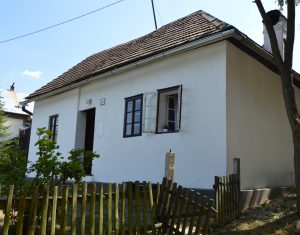 The Durec family lived in a small house in Stara Tura, in part of Topolecka. In that area there were another three houses. In their very modest house they had a kitchen and two bedrooms, in between the kitchen and first bedroom there was a corridor that led into the backyard. In a closed square backyard there was a well with beautiful fresh water.
The Durec family lived in a small house in Stara Tura, in part of Topolecka. In that area there were another three houses. In their very modest house they had a kitchen and two bedrooms, in between the kitchen and first bedroom there was a corridor that led into the backyard. In a closed square backyard there was a well with beautiful fresh water.
“We didn’t have any animals as my parents were very poor,“ remembered Anna Malárová. “Only in the summer they would go to help the farmer at Dolniaky, there they would earn some wheat and buy a pig which would be killed before Christmas.“ Also the house was very simply furnished. In the front room on the floor stood an old fashioned carved wooden chest. “kisňa“ where the bedding was stored.In between the windows stood a 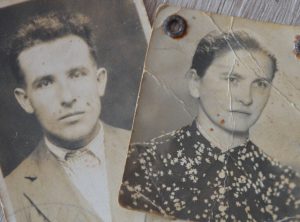 table, two beds next to one wall and a wood burner. In the second room was one bed and a wardrobe for clothes.
table, two beds next to one wall and a wood burner. In the second room was one bed and a wardrobe for clothes.
Up until she was fourteen years old, Anna was brought up by her Grandma in the next village called Paprad, she would visit her parents mostly on Sunday. She also went to school there.
The war
When Stefan Durec was coming home from work he always looked up the hill to see if his house was still standing and that it hadn’t burnt down. This was because in the area where they lived there were local people who were helping the German guards by passing on information about families who were helping the Jews and partisan soldiers. The Germans would kill them when they found them. “The war was a difficult time. German soldiers were walking in the village and surrounding area, searching houses and many locals would be involved helping them. They would tell of people that they thought were hiding Jews,“ remembered Anna. “If they had known about us…? “
The man who came to buy plums
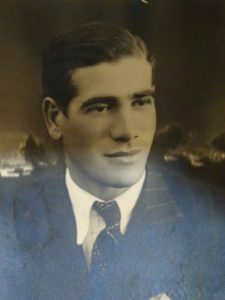 “The man who was hiding in our house was a young man then,” remembers Mrs Malarova. “He had a sister called Magda who was with the partisan soldiers. His name was Ladislav Klein, but during the war they called him Ján Gurčík. He came to us in September when the plums were ripening, “ remembers Anna Malárová, who was nine years old then. “They told me that this man who is buying plums from us will stay with us overnight until the next day.“
“The man who was hiding in our house was a young man then,” remembers Mrs Malarova. “He had a sister called Magda who was with the partisan soldiers. His name was Ladislav Klein, but during the war they called him Ján Gurčík. He came to us in September when the plums were ripening, “ remembers Anna Malárová, who was nine years old then. “They told me that this man who is buying plums from us will stay with us overnight until the next day.“
Ladislav Klein was born in 1917 in Vranove nad Topľou. He came from a Jewish family in which there were seven children. He studied at high school in Kosice and in 1942 a big part of his family was sent to a concentration camp where most of them died. Ladislav Klein managed to leave for the town Nové Mesto nad Váhom where he was working until August 1944 in an alcohol factory. The owner of the factory really valued his work and one day he came to him with money and information that they were going to have a search and that he needed to hide. “At that time Father had false papers with the name Ján Gurčík,“ said his son Tomáš Klein.
He went over the hills on his way to the mountains where he wanted to join the partisans. On the way he met two men and one of them was Štefan Durec.
Nobody knew about Mr Klein in the Durec family. They managed to hide him for many weeks even from the eldest daughter despite him living behind the locked door in the front room. “I came home from Grandma’s house feeling ill,“ remembers Anna. “It was before Christmas. Already there was the first snow. I was lying down and mum went to Stara Tura to buy meat from the butcher, and also, she went to the doctor’s and an office. I was at home on my own crying like a ten year old child does. I was crying so much that the door of the front room opened and Mr Klein asked me if there was anything I needed and if he could help. I refused his help as I was so scared.”
When mum came home, Anička (little Anna) asked her what is the man who was buying plums in September doing in their house. Mrs Durecova explained to her daughter that this man was hiding from the Germans because they would kill him if she told anyone and their whole family would be shot and the house burned down, I was very quiet and I didn’t tell anything to anyone, not even grandma who had looked after me from birth and was the closest person to me.
“Anička truly showed how mature and reliable she was, she didn’t give me up although most of the time chidren cannot keep secrets,“ said Tomáš Klein.
We have a Jew at home !
“My sister was four years younger than me, she was born in 1938 and she had a big mouth,“ said Anna. “She was angry, she swore and if she didn’t like something she would take hold of mum’s skirt kick her in the legs and shout, ‘Wait, I will tell them that you are hiding a Jew !’ “
She didn’t know about Mr Klein in the front room. She just used the threat to get her own way. “She said it just like that, into the air, so mum would be scared and she would do everything that my sister wanted. “ Fortunately, nobody heard these threats apart from the parents and older sister.
When the Nazis came
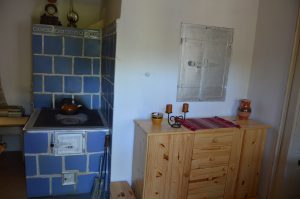 Year 1944. The Germans came to the Durec family. They turned everything upside down including duvets and shelves and they even went to the loft where they stored wheat, “There was a full lorry of them that came,” remembers Anna. “They looked everywhere, in every corner and possible hideout. If I was by chance at home or my sister who was small at the time, when we saw that the Germans were coming, we would run as fast as we could to the house to tell mum as we were just on the hill sledging. ‘Mum, the Germans are coming,’ I shouted at the door and then ran away from the house. In the meantime, mum hid Mr Klein in the wood burner.”
Year 1944. The Germans came to the Durec family. They turned everything upside down including duvets and shelves and they even went to the loft where they stored wheat, “There was a full lorry of them that came,” remembers Anna. “They looked everywhere, in every corner and possible hideout. If I was by chance at home or my sister who was small at the time, when we saw that the Germans were coming, we would run as fast as we could to the house to tell mum as we were just on the hill sledging. ‘Mum, the Germans are coming,’ I shouted at the door and then ran away from the house. In the meantime, mum hid Mr Klein in the wood burner.”
The Durec family had a wood burner in the kitchen where they would bake bread. At the bottom you added the wood and when the wood burner was heated up bread dough was put in a separate part in the top to be baked. When the Germans came to search, Mr Klein was hiding in that top part of the wood burner. The hiding place was approximately one metre by one metre and a half. On the door to the hiding place Mrs Durec put decorative paper like that used by people on their walls at that time to decorate their living space. In front of the little door covered with paper stood a storage rack with shelves full of plates, mugs and some buckets. That is how Anna’s mother Maria hid the little door so nobody would notice it.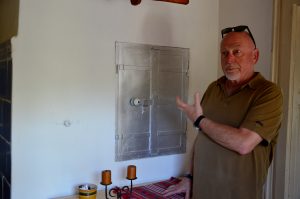
”There was this big wood burner and the day before they baked bread so the wood burner was still warm,” said Tomáš Klein from thememories of his father. “They would put father into the wood burner, the Germans came and in a short time they saw that no one was there as they just had one room.”
The soldiers didn’t notice anything. Mr Klein could hear from inside the wood burner how they spoke German between themselves.
The Germans would come two or three times in a week. They would do a search in the houses and lofts. They would divide into a few groups and search all of the houses close to each other.
“I wasn’t scared,“ said Anna. “A person can get used to anything. So what about a child like me ? I didn’t fully understand everything but I knew I had to listen to my mum, I had to be quiet and I couldn’t say anything to anyone. “
Although Mr Klein was never found, in the village in the Mikulc family they found one or two Jews who they killed along with the family and they burnt their house down.
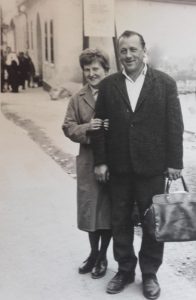
“When my parents saw that he had nowhere to go,
that he couldn’t hide anywhere and that he didn’t have anything to eat,
they felt that they had to help. Father used to say that we are people,
and if we believe that God created all of us
then he created Christians, Jews and everyone else.
So, he hid him.”
Anna Malárová
Month behind the door
Mr Klein couldn’t go out of the house. The Durec family found some books for him so that he could read. When he needed to go to the toilet, he could use the wooden toilet in the yard outside but he could only go out there when nobody was at home and nobody was around in the area. Most of the time he would go at night. Mrs Durec was responsible for keeping him safe, she was in the biggest danger. She had to deal with everything, his safety, cooking and giving him food. “I remember during Christmas when we had Christmas dinner telling my mum, why didn’t she put all of the food that she had cooked on the table? She replied that we will not eat all of it and that we will have some left for tomorrow,” remembers Anna about Christmas in 1944. When the children went to sleep, Anna’s mum called Mr Klein and gave him food wondering if he would eat all of this Christian food, poppy seed dumplings, mushroom soup, cabbage soup with plums and cakes. Mr Klein ate all of it. “What they had, my father had as well,” remembers Tomáš Klein from a conversation he had with his father Ladislav Klein: “My father appreciated this for all these years because the Durec family were very poor.” There is a time when you cannot be fussy. “If I live and I will be able, I will eat what I have,” said Ladislav Klein about the food in front of him.
“Even kosher had to go to the side,” said Mrs Malarova about Mr Klein’s food.
The end of the war
Towards the end of the war, Romanian soldiers came into our area. One high ranking officer and a soldier moved into the Durec family’s front room. Mr Klein was probably still in the house but Anna doesn’t remember where he was hiding. “When the Nazis came with their tanks they took over some hills near us and pointed their cannons towards our houses at Topolecka. Fortunately, there were more Romanian soldiers who fought back and the Germans ran away across the hills to Morava which was just behind the mountains. The battle never happened.”
After the war
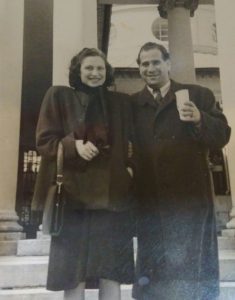 Ladislav Klein left for Bratislava. He found employment and worked as director of technical services for Bratislava. In Bratislava he met his wife Alica, who came from Auschitz with her other three sisters (from eleven children, only four of them survived). They got married in 1946. In 1947, the sisters of Alica and two brothers of Mr Klein who had survived, moved to Israel. The Klein family remained living in Slovakia and were in contact with the Durec family until 1964 when they moved to Israel. “Father travelled a lot through the republic and he took every opportunity to stop at Stara Tura and visit the Durec family. Sometimes on his own and sometimes with us and he kept in contact until we emigrated to Israel. In 1989 when the regime changed we immediately came to visit. They were all still alive.”
Ladislav Klein left for Bratislava. He found employment and worked as director of technical services for Bratislava. In Bratislava he met his wife Alica, who came from Auschitz with her other three sisters (from eleven children, only four of them survived). They got married in 1946. In 1947, the sisters of Alica and two brothers of Mr Klein who had survived, moved to Israel. The Klein family remained living in Slovakia and were in contact with the Durec family until 1964 when they moved to Israel. “Father travelled a lot through the republic and he took every opportunity to stop at Stara Tura and visit the Durec family. Sometimes on his own and sometimes with us and he kept in contact until we emigrated to Israel. In 1989 when the regime changed we immediately came to visit. They were all still alive.”
“The war didn’t just affect our parents but also us, the second generation. Mum struggled with it all of her life, for no reason she would start to cry and she was very sensitive towards us children always making sure we were safe. Father had a different nature.” Tomáš Klein. 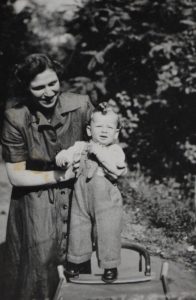
To present day
Although the parents of Mrs Malarova have died and so has Ladislav Klein, the baton has been passed on to his son Tomáš Klein. He is currently living in Prague. “Although I haven’t done anything for him, I think that we are close after the death of our parents. He always likes to come and visit me with his wife,” said Mrs Malarova. She took out the photo. “This is Mr Klein as a little boy. I like them. They are close to me and I hold them dearly in my heart. They are very pleasant people therefore we are very close,” Anna explained about her relationship towardsthe family of Ladislav Klein.
Once Ladislav Klein came to Mrs Malarova and told her: “Anna, I remember very well the time when I came to your father and told him I didn’t have any more money to give him for the food 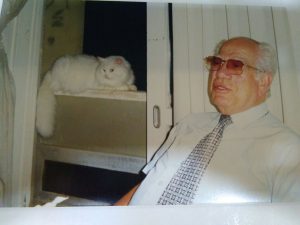 so I would leave. Your father told me: Jan, don’t worry while I have something to eat, so will you.”
so I would leave. Your father told me: Jan, don’t worry while I have something to eat, so will you.”
Ladislav Klein spoke about the Durec family very often. “He saw them as the saviours of his life. He was convinced that without them he would not have survived,” said his son Tomáš. “I always have tears in my eyes when I remember this.”
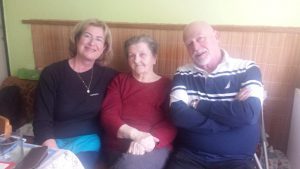
“I value so much that my parents saved Mr Klein and with great respect I remember my parents and him, and that time, as life was really difficult. If I was facing the same situation, I would do the same as it is very courageous to save human beings.” Anna Malárová
The righteous of the nations
In 1995, Mária and Štefan Durec were recognised as the righteous of the nations, thanks to the man who they saved, Ladislav Klein. The Durec family weren’t alive then, so the award was received by their daughter Anna Malárová. “I was very happy that someone rewarded the people who saved those in danger. I was very happy and proud of my parents because those times had been very scary. Who didn’t live through that time would not be able to fully imagine everything that my mum had to do.” remembered Anna about her parents as very good and hardworking people. They lived off what they earnt with their hands. Father was well informed about life, he read a lot for that time and for a villager he was very intelligent and new a lot about history. Mother was also very good although a very modest woman from the village.
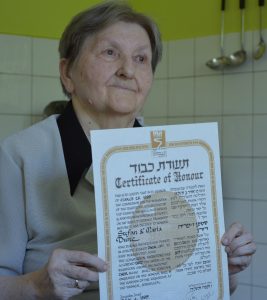 “I am expressing gratitude for my existence as well. Humanity is important. Money there was, there is and will be or maybe not but it is important for life to be easier and better but humanity has a different meaning. If you meet somebody like Anna, you realise that materialistic values are not everything. Humaneness is an important and essential characteristic to have which plays a big role in our lives.” Tomáš Klein
“I am expressing gratitude for my existence as well. Humanity is important. Money there was, there is and will be or maybe not but it is important for life to be easier and better but humanity has a different meaning. If you meet somebody like Anna, you realise that materialistic values are not everything. Humaneness is an important and essential characteristic to have which plays a big role in our lives.” Tomáš Klein
“You only have one life and we are all human. We have to value, honour and help each other.“
Anna Malárová
Ladislav Klein had a son and daughter, six grandchildren and one great grandson.
Anna Malárová died in November 2017.
You can listen to the story Ukrytý v peci (Hidden in the wood burner) about the Durec family and Ladislav Klein and how it was told by Anna Malárová and Tommy Klein.
Televízny dokument o záchrane Ladislava Kleina (TV document about Ladislav Klein) was shown on channel Dvojka.
Translation: Lenka and John Knight

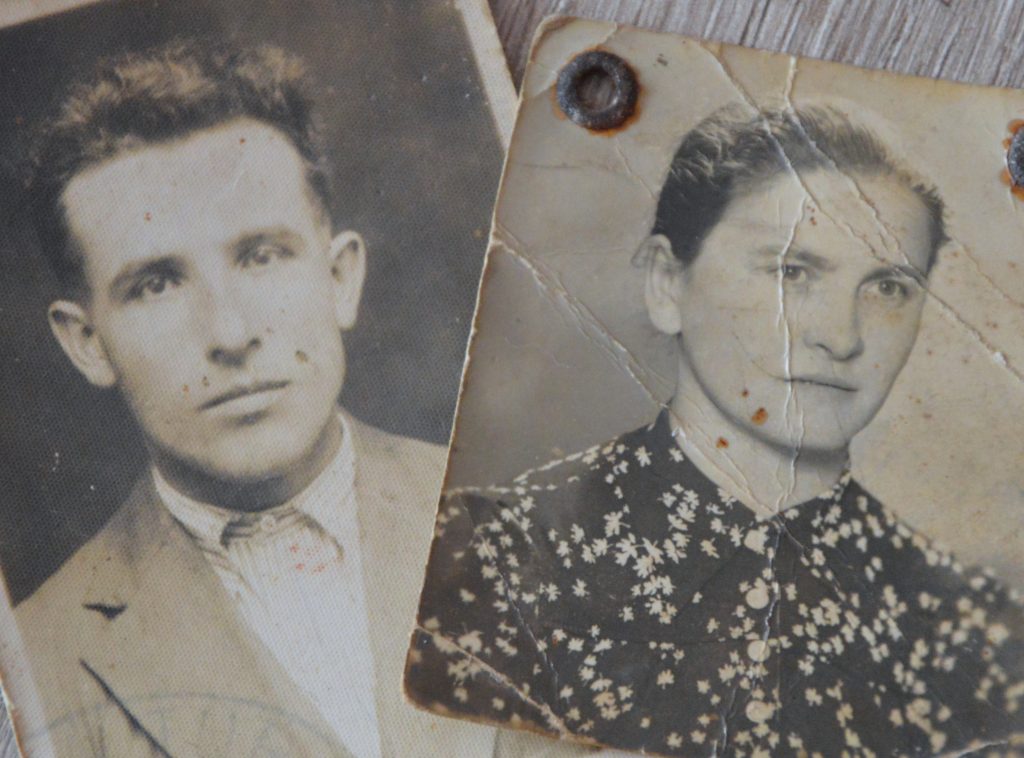

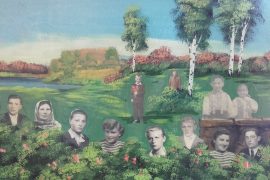
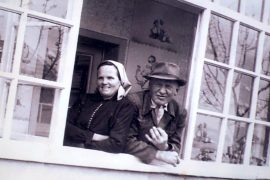
Comments are closed.